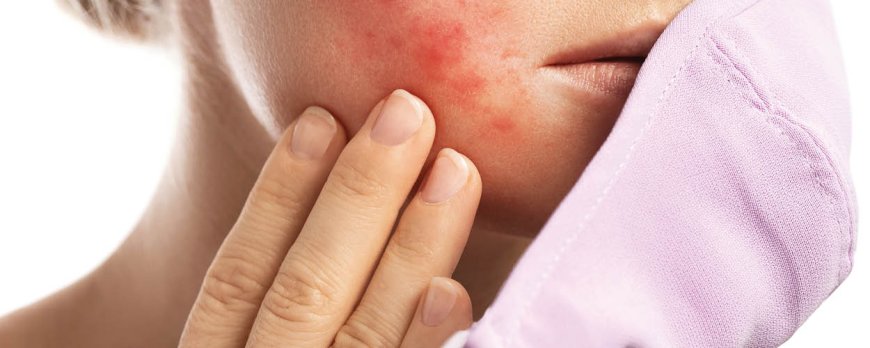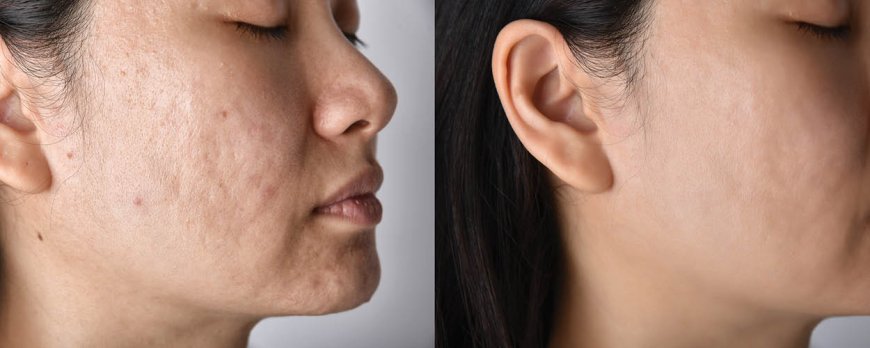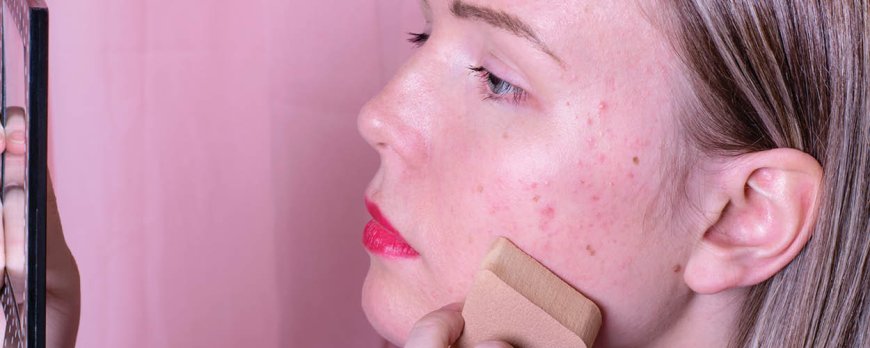Do I have hormonal acne?
Unsure about your skin issues? Our guide can help you answer 'Do I have hormonal acne?' and explain treatment options. Get clear on your skin health.

Do I have hormonal acne?
Hormonal acne is a common skin condition characterized by breakouts that occur due to hormonal fluctuations in the body. It is more prevalent in women because of their hormone fluctuations during menstruation cycles, pregnancy, and menopause. Hormonal acne can manifest in various forms, such as whiteheads, blackheads, papules, pustules, cysts, and nodules.
In teenagers, hormonal acne typically affects the T-zone, while adults may experience breakouts on the jawline, chin, and bottom of the cheeks. These breakouts can be both frustrating and distressing, but there are several treatment options available to manage and alleviate the symptoms of hormonal acne.
Key Takeaways:
- Hormonal acne is a common skin condition caused by hormonal fluctuations.
- It is more common in women due to their hormone fluctuations during menstruation cycles, pregnancy, and menopause.
- It can appear as whiteheads, blackheads, papules, pustules, cysts, and nodules.
- Teenagers often experience hormonal acne in the T-zone, while adults may have breakouts on the jawline, chin, and bottom of the cheeks.
- Treatment options include over-the-counter products, prescription medications, and natural remedies.
Understanding the Causes of Hormonal Acne
Hormonal acne is primarily caused by hormone imbalances, which can be influenced by various factors such as menstruation, pregnancy, and menopause. When hormone levels fluctuate, particularly during these phases, it can lead to increased sebum production and clogged pores, resulting in acne breakouts. This type of acne is more common in women due to their hormonal fluctuations throughout their lifetime.
During menstruation, the levels of estrogen and progesterone in the body change, and this hormonal shift can trigger the development of acne. Similarly, hormonal changes during pregnancy can lead to an increase in oil production and acne breakouts. Menopause, another significant hormonal milestone, can also cause acne due to the decline in estrogen and the imbalance between androgen hormones.
Genetics and family history may also play a role in the development of hormonal acne. If your parents or close relatives have experienced this type of acne, you may be genetically predisposed to it. Other lifestyle factors, such as stress and poor diet, can further contribute to hormonal imbalances and acne breakouts.
Factors Contributing to Hormonal Acne:
- Menstruation and hormonal fluctuations during the menstrual cycle
- Pregnancy and the hormonal changes that occur
- Menopause and the decline in estrogen levels
- Genetics and family history of hormonal acne
- Stress and its impact on hormone levels
- Poor diet and nutrition
Understanding the causes of hormonal acne is crucial in finding effective treatment options. By addressing hormonal imbalances and adopting a holistic approach, it is possible to manage and reduce the occurrence of hormonal acne. Consulting with a doctor or dermatologist can provide personalized guidance and recommendations for treating hormonal acne and achieving clearer, healthier skin.
Identifying the signs of hormonal acne
The signs of hormonal acne may include whiteheads, blackheads, papules, pustules, cysts, and nodules, which often appear in the T-zone in teenagers and on the jawline, chin, and bottom of the cheeks in adults. This type of acne is characterized by inflamed and painful breakouts that are stubborn and slow to heal. Hormonal acne is influenced by hormonal fluctuations, particularly during menstruation cycles, pregnancy, and menopause. Women are more prone to hormonal acne due to their hormonal changes.
One of the key indicators of hormonal acne is the timing of breakouts. They tend to occur consistently during certain times of the month for individuals with menstrual cycles. These breakouts often appear in the same areas and can be accompanied by other symptoms like bloating, breast tenderness, and mood swings.

Common signs of hormonal acne:
- Whiteheads and blackheads
- Papules and pustules
- Cysts and nodules
- Inflamed and painful breakouts
- Recurring breakouts during specific times of the month
It is important to note that hormonal acne can have a significant impact on an individual's self-esteem and emotional well-being. If you are experiencing severe, recurring, or painful acne, it is recommended to consult with a doctor or dermatologist who can provide personalized treatment options.
Treating hormonal acne may involve a combination of over-the-counter options, prescription medications, and natural remedies. Topical treatments containing ingredients such as retinoids, salicylic acid, tea tree oil, and alpha hydroxy acid can help manage hormonal acne by reducing inflammation and unclogging pores. In some cases, birth control pills or anti-androgen drugs may be prescribed by a healthcare professional to regulate hormone levels and decrease oil production.
While hormonal acne can improve over time as the body adjusts to hormonal changes, it is important to address it with proper care. By seeking medical advice and exploring various treatment options, individuals can effectively manage and minimize the impact of hormonal acne on their skin.
Treatment options for hormonal acne
There are several treatment options for hormonal acne, including over-the-counter products, prescription medications, and natural remedies. Finding the right treatment approach may require some trial and error, as everyone's skin and hormone levels are unique. It is recommended to consult with a doctor or dermatologist for personalized advice and guidance.
Over-the-counter products
- Retinoids: These topical medications help unclog pores and prevent new acne breakouts. Look for products that contain adapalene or tretinoin.
- Salicylic acid: This ingredient exfoliates the skin and helps remove dead cells and excess oil. It can be found in cleansers, toners, and spot treatments.
- Tea tree oil: Known for its antibacterial properties, tea tree oil can be an effective natural remedy for hormonal acne. Dilute it with a carrier oil before applying it to the skin.
- Alpha hydroxy acid: AHAs, such as glycolic acid and lactic acid, can help exfoliate the skin and reduce the appearance of acne scars.
Prescription medications
- Birth control pills: Certain types of birth control pills can help regulate hormone levels and decrease oil production, reducing the frequency and severity of hormonal acne.
- Anti-androgen drugs: These medications block the effects of androgens, which can contribute to acne formation. They are often prescribed for more severe cases of hormonal acne.
Natural remedies
While natural remedies may not work for everyone, some people find relief from hormonal acne through lifestyle changes and holistic approaches. These may include:
- Eating a balanced diet: Incorporating more fruits, vegetables, and whole grains while reducing processed foods and sugar can help promote clearer skin.
- Managing stress: Stress can impact hormone levels, so finding healthy ways to cope with stress, such as exercise, meditation, or therapy, may help improve hormonal acne.
- Using gentle skincare products: Harsh cleansers and abrasive scrubs can irritate the skin and worsen acne. Opt for gentle, non-comedogenic products.
- Getting enough sleep: Lack of sleep can affect hormone regulation and exacerbate hormonal acne. Aim for 7-9 hours of quality sleep each night.
Remember, what works for one person may not work for another. It's important to be patient and consistent with any chosen treatment plan, giving it time to show results. Severe, recurring, or painful acne should be evaluated by a healthcare professional who can provide appropriate guidance and treatment options tailored to your individual needs.
Over-the-Counter Options for Hormonal Acne
Over-the-counter treatments such as retinoids, salicylic acid, tea tree oil, and alpha hydroxy acid can be effective in reducing hormonal acne. These readily available products can help control oil production, reduce inflammation, and unclog pores, addressing the underlying causes of hormonal acne.
1. Retinoids
Retinoids are derivatives of vitamin A and are known for their ability to speed up cell turnover, prevent clogged pores, and promote the growth of new, healthy skin. They can be found in the form of creams, gels, or serums and are usually applied at night.
2. Salicylic Acid
Salicylic acid is a beta hydroxy acid that exfoliates the skin, unclogs pores, and reduces inflammation. It is commonly found in cleansers, toners, and spot treatments. Regular use of salicylic acid can help prevent breakouts and promote clearer skin.
3. Tea Tree Oil
Tea tree oil has natural antibacterial and anti-inflammatory properties, making it an effective treatment for hormonal acne. It can be applied directly to the affected areas or diluted with a carrier oil to avoid skin irritation. Tea tree oil can help reduce redness, swelling, and the appearance of blemishes.
4. Alpha Hydroxy Acid
Alpha hydroxy acids (AHAs), such as glycolic acid and lactic acid, exfoliate the skin and help remove dead skin cells, unclog pores, and improve skin texture. They can be found in various skincare products like cleansers, toners, and serums. Regular use of AHAs can promote smoother and clearer skin.
While over-the-counter options can be effective for mild to moderate hormonal acne, it is important to note that individual results may vary. It is advisable to consult with a dermatologist or healthcare professional for personalized advice and treatment options, especially for severe or persistent acne. Additionally, maintaining a consistent skincare routine, practicing good hygiene, and adopting a healthy lifestyle can contribute to managing hormonal acne and promoting overall skin health.
Prescription Medications for Hormonal Acne
In more severe cases, dermatologists may recommend prescription medications such as birth control pills or anti-androgen drugs to regulate hormones and decrease oil production. These medications work by targeting the hormonal imbalances that contribute to the development of acne. Here are some commonly prescribed prescription medications for hormonal acne:
1. Birth control pills:
Birth control pills containing estrogen and progestin can help regulate hormone levels and reduce the severity of hormonal acne. They work by suppressing the production of androgens, which can cause excess oil production and clogged pores. Certain types of birth control pills, such as Yaz and Ortho Tri-Cyclen, have been specifically approved by the FDA for treating acne.
2. Anti-androgen drugs:
Anti-androgen drugs, such as spironolactone, can block the effects of androgens on the skin. Androgens are male hormones that can stimulate oil production and trigger acne. By reducing the activity of androgens, anti-androgen drugs can help decrease oil production and prevent the formation of acne lesions. These medications are typically prescribed for women with hormonal acne that is resistant to other treatments.
3. Isotretinoin:
Isotretinoin, commonly known as Accutane, is a powerful oral medication that is often used for severe cases of acne, including hormonal acne. It works by reducing oil production, shrinking the sebaceous glands, and preventing the formation of acne-causing bacteria. Isotretinoin is generally prescribed as a last resort due to its potential side effects and requires close monitoring by a dermatologist.
It is important to note that prescription medications for hormonal acne should be used under the guidance of a healthcare professional. They may not be suitable for everyone and can have potential side effects. It is recommended to consult with a dermatologist to determine the most appropriate treatment option based on individual needs and circumstances.
While prescription medications can be effective for managing hormonal acne, it is also essential to maintain a consistent skincare routine and adopt healthy lifestyle habits. Regular cleansing, exfoliation, and moisturizing can help keep the skin clean and prevent clogged pores. Additionally, incorporating a balanced diet, managing stress levels, and getting enough sleep can also contribute to overall skin health and reduce the frequency of hormonal acne breakouts.

Natural Remedies for Hormonal Acne
Alongside medical treatments, incorporating natural remedies such as a healthy diet, stress reduction techniques, and proper skincare can support the management of hormonal acne.
1. Diet: A balanced diet rich in fruits, vegetables, whole grains, and lean proteins can help regulate hormones and reduce inflammation associated with hormonal acne. Incorporating foods high in omega-3 fatty acids, such as fatty fish and walnuts, can also be beneficial.
2. Stress reduction: Chronic stress can contribute to hormonal imbalances and trigger acne breakouts. Managing stress through techniques such as meditation, yoga, and regular exercise can help improve hormonal balance and reduce the occurrence of acne flare-ups.
3. Skincare routine: Using gentle, non-comedogenic skincare products can help keep the skin clean and free from excess oil and bacteria. Cleansers containing tea tree oil or salicylic acid can help unclog pores and reduce inflammation. Additionally, regularly exfoliating the skin with a mild scrub or chemical exfoliant can promote cell turnover and prevent pore congestion.
Additional Measures
- Getting enough sleep: Quality sleep is essential for hormonal regulation and overall skin health. Aim for 7-9 hours of uninterrupted sleep each night.
- Avoiding harsh chemicals: Harsh skincare products and cosmetics can irritate the skin and worsen acne. Opt for gentle, fragrance-free options specifically formulated for acne-prone skin.
- Limiting dairy and refined sugars: Some studies suggest that dairy products and high-glycemic foods like sugary snacks and sodas may worsen hormonal acne. Consider reducing consumption of these foods and monitoring their effects on your skin.
- Using natural remedies: Tea tree oil, witch hazel, and aloe vera gel are known for their anti-inflammatory and antibacterial properties. Applying these natural remedies topically can help soothe and heal acne-prone skin.
While these natural remedies can complement medical treatments for hormonal acne, it is important to consult with a healthcare professional or dermatologist for personalized advice and treatment options.
Remember, hormonal acne may take time to improve, and a multifaceted approach that combines both medical and natural remedies is often the most effective way to manage and minimize breakouts.
Hormonal Acne Diet
While diet alone cannot cure hormonal acne, certain dietary changes can play a role in improving symptoms. Making adjustments to your diet may help reduce inflammation, balance hormones, and promote healthier skin. Incorporating the following dietary changes could potentially benefit those struggling with hormonal acne:
1. Reduce Sugar Intake
Consuming excessive amounts of sugar can contribute to hormonal imbalances and inflammation, both of which can worsen acne. Cut back on sugary beverages, processed snacks, and desserts. Instead, opt for natural sweeteners like honey or fruit to satisfy your sweet tooth.
2. Limit Dairy Consumption
Studies have shown a possible link between dairy consumption and acne. Dairy products can contain hormones that may exacerbate acne breakouts. Consider reducing your intake of milk, cheese, and other dairy products to see if it has a positive impact on your skin.
3. Avoid Processed Foods
Processed foods often contain high levels of refined carbohydrates, unhealthy fats, and artificial additives that can trigger inflammation and disrupt hormone balance. Instead, focus on consuming whole foods such as fruits, vegetables, lean proteins, and whole grains.
4. Increase Antioxidant-Rich Foods
Antioxidants help combat inflammation and oxidative stress, which can contribute to acne development. Include foods rich in antioxidants, such as berries, leafy greens, dark chocolate, and green tea, in your diet to support healthy skin.
5. Stay Hydrated
Drinking an adequate amount of water is essential for maintaining overall health, including skin health. Proper hydration helps flush out toxins and keeps your skin hydrated. Aim to drink at least eight glasses of water per day.
Remember, everyone's body is different, and what works for one person may not work for another. If you're experiencing severe or persistent hormonal acne, it's best to consult with a medical professional or dermatologist who can provide personalized advice and treatment options.
By making sensible dietary choices and maintaining a consistent skincare routine, you can support your body's natural healing processes and improve the appearance of hormonal acne.

Hormonal Acne vs Regular Acne
Hormonal acne differs from regular acne in its causes, symptoms, and treatment approach. Understanding these differences can help determine the most effective treatment plan.
Causes: Hormonal acne is primarily triggered by fluctuations in hormone levels. It commonly occurs during menstrual cycles, pregnancy, and menopause, when hormones such as estrogen and testosterone fluctuate. Regular acne, on the other hand, can be caused by factors like excess oil production, clogged pores, bacteria, and inflammation.
Symptoms: Hormonal acne is often characterized by breakouts on specific areas of the face. Teenagers usually experience acne in the T-zone, while adults may have breakouts on the jawline, chin, and bottom of the cheeks. It can manifest as whiteheads, blackheads, papules, pustules, cysts, and nodules. Regular acne, on the other hand, can occur on the face, neck, chest, back, or shoulders.
Treatment Approach: Treating hormonal acne involves addressing the underlying hormonal imbalances. Over-the-counter options like retinoids, salicylic acid, tea tree oil, and alpha hydroxy acid can help reduce inflammation and regulate oil production. Prescription medications such as birth control pills and anti-androgen drugs may be prescribed to regulate hormones and decrease oil production. Natural remedies like maintaining a balanced diet, reducing stress, and practicing good skincare habits can also complement the treatment. Regular acne is often managed with similar treatments, but the emphasis may be more on controlling oil production and reducing bacteria.
Conclusion
While hormonal acne can be frustrating, there are numerous treatment options available to manage and improve this condition. Consulting with a doctor or dermatologist is recommended for personalized treatment plans.
Hormonal acne is a type of acne that occurs when hormone levels fluctuate, particularly during menstruation cycles, pregnancy, and menopause. It is more common in women due to their hormone fluctuations. Hormonal acne can appear as whiteheads, blackheads, papules, pustules, cysts, and nodules. It typically affects the T-zone in teenagers, while adults may experience breakouts on the jawline, chin, and bottom of the cheeks.
There are various treatments available for hormonal acne, including over-the-counter options, prescription medications, and natural remedies. Retinoids, salicylic acid, tea tree oil, and alpha hydroxy acid are commonly used to treat hormonal acne. Birth control pills and anti-androgen drugs may also be prescribed to regulate hormones and decrease oil production.
It is recommended to consult with a doctor or dermatologist for severe, recurring, or painful acne. Hormonal acne can improve over time as the body adjusts to hormonal changes, but personalized treatment may be necessary to completely get rid of it.
FAQ
Do I have hormonal acne?
Hormonal acne is characterized by breakouts that occur when hormone levels fluctuate. If you experience acne flare-ups during menstruation cycles, pregnancy, or menopause, there is a possibility that you have hormonal acne. It is more common in women due to their hormone fluctuations.
What are the signs of hormonal acne?
Hormonal acne can manifest as whiteheads, blackheads, papules, pustules, cysts, or nodules. In teenagers, it typically affects the T-zone, while adults may experience breakouts on the jawline, chin, and bottom of the cheeks. It is important to note that hormonal acne can vary in severity from person to person.
What are the treatment options for hormonal acne?
There are various treatment options available for hormonal acne. Over-the-counter options include products containing ingredients such as retinoids, salicylic acid, tea tree oil, and alpha hydroxy acid. Prescription medications, such as birth control pills and anti-androgen drugs, may also be prescribed to regulate hormones and decrease oil production. Additionally, natural remedies and lifestyle changes, such as maintaining a healthy diet and managing stress, can help alleviate hormonal acne.
How can I differentiate hormonal acne from regular acne?
Hormonal acne is specifically linked to hormonal fluctuations, while regular acne can have various causes such as excess oil production, bacteria, or clogged pores. Hormonal acne is often characterized by breakouts that occur during specific times, such as menstruation cycles, pregnancy, or menopause. Consulting with a doctor or dermatologist can help in correctly identifying the type of acne you may have.


































































































































